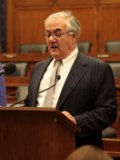Internet Gambling Debated in House Financial Services Committee

 Once again, internet gambling took center stage in the House Financial Services Committee. On Wednesday around 2:30pm ET, a two and a half hour hearing kicked off focusing on HR 2267, the Internet Gambling Regulation, Consumer Protection, and Enforcement Act. The bill, proposed by Congressman Barney Frank (D-MA, pictured), provides a full licensing and regulatory framework for internet gambling companies to solicit customers from the United States.
Once again, internet gambling took center stage in the House Financial Services Committee. On Wednesday around 2:30pm ET, a two and a half hour hearing kicked off focusing on HR 2267, the Internet Gambling Regulation, Consumer Protection, and Enforcement Act. The bill, proposed by Congressman Barney Frank (D-MA, pictured), provides a full licensing and regulatory framework for internet gambling companies to solicit customers from the United States.
 Kicking off the meeting was Congressman Spencer Bachus (R-AL, pictured), the Ranking Member of the House Financial Services Committee. Bachus pointed out, “Criminal offshore gaming interests have been relentless in their campaigns to repeal the [Unlawful Internet Gambling Enforcement Act]. Lots of these groups have innocuous names like the Safe and Secure Internet Gambling Initiative, but they are large corporate interests protecting the bottom line at the expense of… our youth and communities.”
Kicking off the meeting was Congressman Spencer Bachus (R-AL, pictured), the Ranking Member of the House Financial Services Committee. Bachus pointed out, “Criminal offshore gaming interests have been relentless in their campaigns to repeal the [Unlawful Internet Gambling Enforcement Act]. Lots of these groups have innocuous names like the Safe and Secure Internet Gambling Initiative, but they are large corporate interests protecting the bottom line at the expense of… our youth and communities.”
Congressman John Campbell(R-CA) championed the internet gambling cause throughout most of the hearing despite being on the opposing party to Frank. Campbell remarked, “Law abiding citizens are banding together to play in what is now an illegal activity. There’s no reason we need to make those law abiding citizens into criminals. We can provide them protection they’re not currently getting on sites because they’re overseas. And, we can provide economic growth in this country by making sure gambling operations are located here.”
 Five witnesses gave their own unique insight into the industry, including UB.compro Annie Duke (pictured), who spoke on behalf of the Poker Players Alliance (PPA). Duke pointed out the considerable growth of poker by giving registration statistics for the World Series of Poker Main Event. She explained, “At its most basic level, the issue before this committee is personal freedom – the right of individual Americans to do what they want in the privacy of their homes without the intrusion of the government.” Duke also pointed out that the UIGEA was a “banking law” on multiple occasions.
Five witnesses gave their own unique insight into the industry, including UB.compro Annie Duke (pictured), who spoke on behalf of the Poker Players Alliance (PPA). Duke pointed out the considerable growth of poker by giving registration statistics for the World Series of Poker Main Event. She explained, “At its most basic level, the issue before this committee is personal freedom – the right of individual Americans to do what they want in the privacy of their homes without the intrusion of the government.” Duke also pointed out that the UIGEA was a “banking law” on multiple occasions.
Coming out against HR 2267 was Joe Baca (D-CA), who told the assembled panel and his colleagues, “This bill does nothing to protect American jobs at a time when America needs jobs. It does nothing to prevent problem gambling. This scope of gaming will open up gaming to children.” He was also concerned about the sovereignty of Indian tribes.
After hearing testimony from the five-witness panel – which included testimony from the Mohegan Tribe and the Commerce Casino – Frank casually pointed out, “Opposition to this bill consists of people who think [gambling] is terrible and people who think it’s so wonderful that they don’t want anyone to compete with them in it.” Also discussed during the hearing were the cheating scandal at UB.com and an article in the Vancouver Sun newspaper about organized crime and internet gambling.
 Duke pointed out that 70 million Americans play poker: “The industry is growing and it’s not going to go away.” Lynn Malerba, the soon-to-be-Chief of the Mohegan Tribe, added that the group will gladly work with Frank: “We do believe there are certain aspects of the regulations that would need to be changed, but we want to work with the committee to change the bill. The businesses that have embraced online have grown.”
Duke pointed out that 70 million Americans play poker: “The industry is growing and it’s not going to go away.” Lynn Malerba, the soon-to-be-Chief of the Mohegan Tribe, added that the group will gladly work with Frank: “We do believe there are certain aspects of the regulations that would need to be changed, but we want to work with the committee to change the bill. The businesses that have embraced online have grown.”
After a 45-minute break for a floor vote, Duke told the Committee, “One of the big issues I have with the UIGEA is that it doesn’t protect minors or consumers. It’s strictly a banking rule. I would like to see more regulations to use verification software. Most of the reputable operators do this and they’re licensed by friends of this nation like the U.K.”
Law enforcement and anti-terrorism consultant Michael Fagan, a witness, appeared to be ardently against the legalization of online gambling: “Internet operators don’t care who is gambling.” He then equated minors gambling online to underage alcohol use: “Anybody who grew up in America knows someone who went out and bought liquor [underage] and the same thing will happen on the internet.”
In the waning moments, Campbell announced that he would offer up an amendment to HR 2267 in a markup hearing scheduled for next week. It was the first allusion to a schedule for the future of the bill; a markup hearing is the first step towards passage. No official markup date has been announced. Check out the archived webcast.




